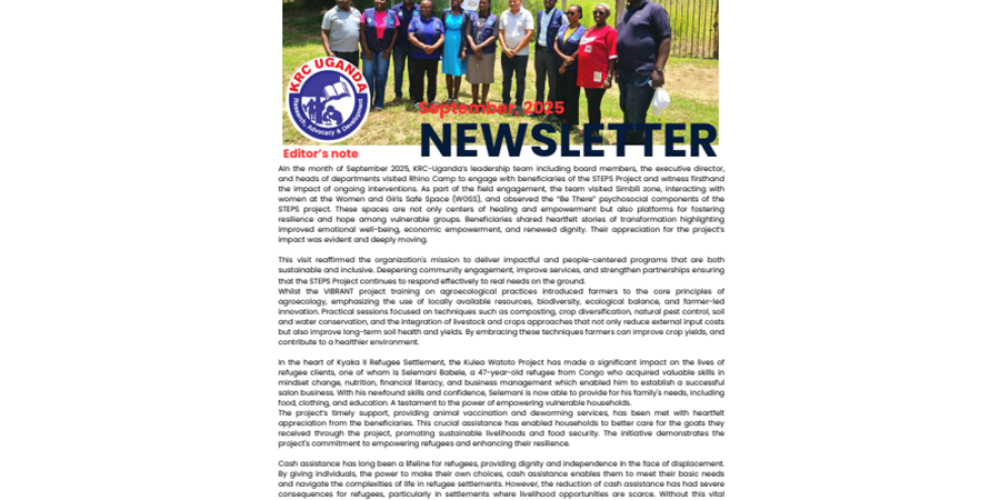In the month of September 2025, KRC-Uganda’s leadership team including board members, the executive director, and heads of departments visited Rhino Camp to engage with beneficiaries of the STEPS Project and witness firsthand the impact of ongoing interventions. As part of the field engagement, the team visited Simbili zone, interacting with women at the Women and Girls Safe Space (WGSS), and observed the “Be There” psychosocial components of the STEPS project. These spaces are not only centers of healing and empowerment but also platforms for fostering resilience and hope among vulnerable groups. Beneficiaries shared heartfelt stories of transformation highlighting, improved emotional well-being, economic empowerment, and renewed dignity. Their appreciation for the project’s impact was evident and deeply moving. This visit reaffirmed the organization’s mission to deliver impactful and people-centered programs that are both sustainable and inclusive. Deepening community engagement, improve services, and strengthen partnerships ensuring
that the STEPS Project continues to respond effectively to real needs on the ground.
Whilst the VIBRANT project training on agroecological practices introduced farmers to the core principles of agroecology, emphasizing the use of locally available resources, biodiversity, ecological balance, and farmer-led innovation. Practical sessions focused on techniques such as composting, crop diversification, natural pest control, soil and water conservation, and the integration of livestock and crops approaches that not only reduce external input costs
but also improve long-term soil health and yields. By embracing these techniques farmers can improve crop yields, and
contribute to a healthier environment.
In the heart of Kyaka II Refugee Settlement, the Kulea Watoto Project has made a significant impact on the lives of refugee clients, one of whom is Selemani Babele, a 47-year-old refugee from Congo who acquired valuable skills in mindset change, nutrition, financial literacy, and business management which enabled him to establish a successful salon business. With his newfound skills and confidence, Selemani is now able to provide for his family’s needs, including food, clothing, and education. A testament to the power of empowering vulnerable households.
The project’s timely support, providing animal vaccination and deworming services, has been met with heartfelt appreciation from the beneficiaries. This crucial assistance has enabled households to better care for the goats they received through the project, promoting sustainable livelihoods and food security. The initiative demonstrates the project’s commitment to empowering refugees and enhancing their resilience.
Cash assistance has long been a lifeline for refugees, providing dignity and independence in the face of displacement.
By giving individuals, the power to make their own choices, cash assistance enables them to meet their basic needs and navigate the complexities of life in refugee settlements. However, the reduction of cash assistance has had severe consequences for refugees, particularly in settlements where livelihood opportunities are scarce. Without this vital support, refugees are left struggling to survive with many facing increased vulnerability to poverty, hunger and exploitation.


